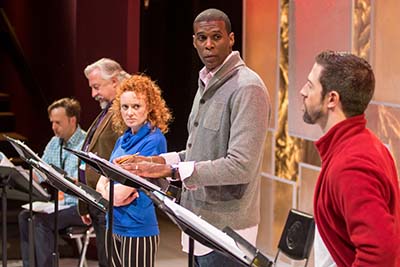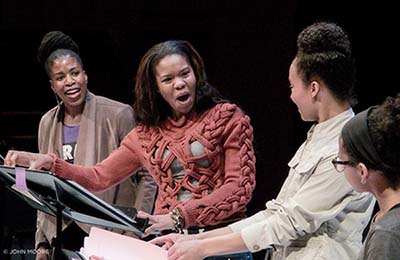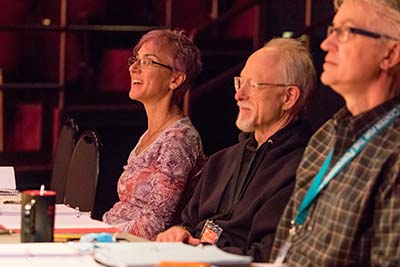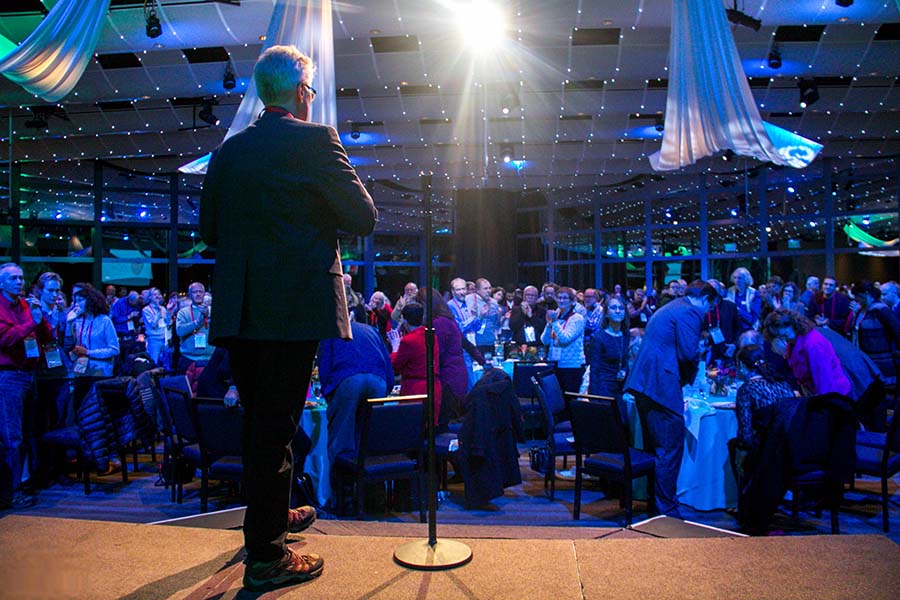A sweet moment of cross-cultural frisson was taking place during the reading of Human Error at the 12th Colorado New Play Summit. Open-hearted Heather and brainy Keenan were finding common ground.
There hadn’t been a lot of it—at least not in obvious ways. Eric Pfeffinger’s comedy charts the gestating relationship of two very different couples bound by a fertility clinic mistake. A big one. Heather, a traditional, white Christian, confesses that when it comes to music, her church is a little lacking in—she raises her hands up in a hallelujah gesture. An academic researcher studying comedy, Keenan grew up in the black church. And though he doesn’t attend church any longer, he admits he misses the hymns. He begins singing one. Heather joins in. Soon they’re grooving to “Trouble in My Way, Sometimes I Have to Cry.”

In the midst of this ecstatic revelry, Kennan’s pint-size wife, Madelyn, happens on them. We know she’s gonna be thrown: She’s wound a little too tight, and not just because her fertilized egg happened to land in Heather’s womb. But when the script belonging to the actress playing Madelyn missed the music stand and scattered its pages on the ground, it felt in sync with her character’s fluster. She smiled. The gathered audience—a mix of industry visitors and local subscribers and patrons—applauded and laughed.
The Denver Center for the Performing Arts two-week new play development gathering, which this year ran Feb. 18-26, is designed to provide a forgiving, embracing space to playwrights as they work out the kinks, soothe the hiccups, and rewrite pages and pages and pages. Its two-week structure means that playwrights workshop their plays a week before the first public reading, then get to plunge back into the process before a reading during the subsequent “industry” weekend. There’s also a late-night Playwright Slam, which finds current Summit playwrights and DCPA-commissioned playwrights sharing a stage; this year the Slam offerings veered from fury to tenderness, from bashful to strutting, as they tweaked scenes or refined slivers of ideas that might end up in future plays. Lauren Gunderson picked up a ukulele and strummed a gentle wail of a song for a one-woman show she’s at work on, nudged by her grandfather’s fight with Alzheimers. Why? Because, as she told the audience, “as a theatre person that’s the only way I can understand it.”
After 12 years at it, the Colorado New Play Summit has buttressed its identity as a top-notch incubator, as plays and playwrights it fostered continue to get produced at theatres throughout the country. Including right at home: Each year, concurrent with the Summit, Denver Center typically mounts two full productions from the previous year’s readings. Jason Grote’s 1001, Octavio Solis’ Lydia, Samuel D. Hunter’s The Whale, and Tanya Saracho’s Fade all went from Summit readings to Denver Center world premieres before fanning across the country to other high-profile theatres.
If attendees detected an added hint of the bittersweet amid this year’s new-play pleasures, it was likely because Kent Thompson’s tenure as producing artistic director of the Denver Center Theatre Company would soon come to an end. He announced his resignation in early January but stayed on to shepherd this year’s Summit and direct the company’s production of The Christians. For the next few months he’ll advise on the upcoming season as well as on the transition. (His last day on the job was March 3.)
Whoever the next artistic director is, they’ll inherit two of Thompson’s signature and complementary programs: the Summit and the Women’s Voices Fund. Currently at $1.3 million, the endowment supports female playwrights and directors.

Since there have been conflicting reports on the reasons behind Thompson’s departure, there’s been a general anxiety that the Denver Center might pull back on its commitment to new plays. “To keep a festival like this going, you have to have a lot of projects in the hopper that are in different developmental stages,” said Andrew Leynse, who heads the Perry-Mansfield New Works Festival each summer in Steamboat Springs, Colo., and is also artistic director of Primary Stages in New York City. “You have to allow workshop time before you get into that rehearsal room.” The resources and institutional fortitude it requires to nurture fresh work and new voices can be daunting.
Leynse feels that the Summit has put Denver Center “in a completely different place on the national stage. If you see where the plays begin and where they go out and all the theatres they’re produced at and all the artists who’ve been successful, the national recognition that it provides—it’s tremendous for an institution.” And not just for the institution but for the field: “To have a festival like the Denver Center’s is essential to the number of playwrights out there,” Leynse said. “It allows for all those opportunities. It won’t exist without festivals like this.”
As the company seeks Thompson’s replacement, the future of the Summit has been on the minds of Denver Center trustees as well, said president and CEO Janice Sinden. “We want to be open-minded enough that we bring in an artistic director that has their own ideas, their own brand about what theatre is,” she said. “But we are also going to be very committed to looking for someone who shares our core values and wants to keep the work we’ve been doing going. Will the New Play Summit look exactly like what it does now? I don’t think anybody knows. But our commitment to new-play work is fundamental.”
Getting the full production treatment at this year’s Summit were Gunderson’s fleet, often moving comedy, The Book of Will, about the efforts of a group of the Bard’s fellow players and friends to publish the First Folio, and Tira Palmquist’s Two Degrees, which navigates the politics of climate change and the icy shards of personal loss with grit and grace. Gunderson’s play has already been slotted into the upcoming season at Hudson Valley Shakespeare Festival, the Round House in the D.C area and Northlight Theatre in Skokie, Ill. Northlight will also mount another Summit-brewed play, Matthew Lopez’s The Legend of Georgia McBride. (At press time, the Denver Center team was hashing out which Summit readings would get full productions in its 2017-2018 season.)
While Primary Stages’ Leynse was attending the Summit, one of last year’s premieres, Tanya Saracho’s Fade, about the friendship between a television writer and a custodian, was ending its run at his theatre in New York. This was the first full production he’d done of a Summit-generated play, but, he pointed out, “Writers we have produced have had work in the Summit,” and it’s where he first caught Fade. He added that he found this year’s offerings strong.
Thompson agreed. “The playwrights seemed to be pursuing pretty sophisticated writing, and clearly there was a lot of writing responding to what’s going on in the world today,” he said.

Of the five readings, three were Denver Center commissions. Robert Schenkkan’s Hanussen recounts the story of Erik Jan Hanussen, the Austrian con artist—or was he a true clairvoyant?—who ingratiated himself with an S.S. honcho during the rise of Hitler and the Third Reich. You can always count on a visit to Weimer-era Germany to offer uncomfortable insights into our current moment. Rogelio Martinez’s Blind Date takes on Ronald Reagan and Mikhail Gorbachev’s wary minuet of diplomacy, which helped close the chapter on the Cold War (or at least it appeared to at the time). Lauren Yee’s Manford at the Line or the Great Leap, about a Chinese-American basketball player who wants desperately to play on the U.S. team headed to Beijing in 1989, straddles historic events (the student-led protests at Tiananmen Square) and the aching yearning of one young soul.
The two non-commissioned works might not have been as overtly political, yet their vibrations with our current moment were undeniable. In Human Error, Pfeffinger tussles with ideologies, assumptions, and actions. And Donnetta Lavinia Grays’s stirring drama Last Night and the Night Before tangles with the possibilities and the fragility of family.
There’s good reason for the sense that new plays inhale the air of the zeitgeist: These playwrights take seriously the moment they’re living in. “Why are the writers writing plays like this right now?” said Nataki Garrett, Denver Center’s recently arrived associate artistic director. She sketched out a few other questions addressed by writers’ work: “What are they listening to? What kind of world are they trying to reflect?” With Garrett on board—who joins Denver Center literary manager Doug Langworthy and Charlie Miller, associate artistic director of strategy and innovation, in advancing the Denver Center’s commitment to new voices and new works—those who are concerned about the company’s commitment to new writing may rest a little easier.
“If you listen to the most famous writers, or to the scrappy graduate school writers, they have their ear to the ground,” Garrett continued. “The writer has to have their ear to the history, to the past. And they have to have their ear to the future. Their job is to straddle both worlds: to let us know how we got here and their hope for where we’re going.”
Former Denver Post film/theatre critic Lisa Kennedy writes on theatre, film, books and culture. She has written for The New York Times, Newsday, CNN Opinion, and Essence magazine.


